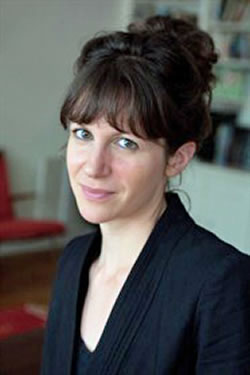|
A story is something that must be told. Except that every time I start a new project—essay, short story, novel—I have nothing to say. No mission. No sense of where I'm going, or of how long it will take me to get there. I sit down at my desk armed with scraps, bits and pieces I've carried around for years and can't seem to shake: a line I overheard in the park one afternoon (a mother screaming at her teenage daughter: "You're a victim! You're a victim!"), a moment during a funeral (the father of the deceased adjusts his glasses). I start writing to see how far I can open those details up, knowing there's no guarantee any of them will.
All I have is the impulse, the faint hope that the tightrope is there.
But there are more sensible ways to write. I've heard other writers talk about them, with a familiarity that makes me want to sink into the floorboards. They describe index cards and timelines, elaborate wall display mapping out character development, plotlines they've diagrammed neatly above their desks. It all sounds very organized and sane and, frankly, inconceivable. When I was teaching, I pretended I was like those writers: "Try color-coordinating your characters with markers!" I told my class. "Block out how much space each character takes up on the page!" I figured if my students knew how many of my pages ended up in a file marked "NEVER MIND", they'd walk out. No one wants to learn from someone whose methodology involves squeezing her eyes shut and praying.
This sense of blind fumbling only deepens when the work in question is a novel. There are that many more opportunities for disaster. When I started writing the first pages of what would eventually become my novel, Autobiography of Us, all I brought to my desk was a snake. This particular snake had made an appearance at a friend's wedding weekend brunch years before and stuck, fastened to my brain like a burr. Two years and dozens of drafts later, the wedding had ballooned from a single scene to fifty pages and the snake had been replaced by another uninvited guest, a man who became one of the book's main characters. Had I known that what interested me about the snake was not the animal, but rather the idea of The Unknown sneaking its way into a celebration, I could have saved myself months of work (not to mention tears). But I had to stumble around in all the snake's possibilities before I found my way out. I had to write my way through the snake to discover what I wanted to say.
If it sounds awful, all this searching and obfuscation, it is. There's nothing nice about being asked "so…what are you writing about?" and having to shrug and admit you don't have a clue. Which is why I was surprised to find myself, a few months ago, missing that old ignorance. Finishing a book—really finishing it, relinquishing your Vulcan death-grip on it and allowing it to sail out into the world—means making sure you know it inside and out. It means re-writing and re-thinking every single sentence, picking up and considering every comma and colon, weighing each word against all the other possible words. By the time my editor sent my book back to me for a final, pre-publication read, I'd examined those pages so many times, with such painstaking care, I felt ill at the idea of encountering them again.
Turns out I knew no more than I ever had. I cried when I got to the last page. Not because I was disappointed or impressed, but because I had no idea I'd written such a sad story. Nor did I realize I'd written something so full of longing. But there it was, on every page, a raw need I never would have identified as my own. I'd just found out I was pregnant with my husband's and my first when I read Autobiography through that final time, and maybe the most surprising realization that struck me as I read was that part of the longing in the book was the longing for a child. When I started the book, and all during the years it took me to write it, I hadn't known I wanted to be a mother. Nor had I guessed becoming one would turn out to be such a difficult process, bringing its own heartbreak along the way. Maybe the most astonishing thing about writing is the same thing that makes getting older a process of ongoing revelation: you bumble along like an idiot, only to discover you've known the answers all along. It takes a wallop of trust for the truth to show its face.
|


